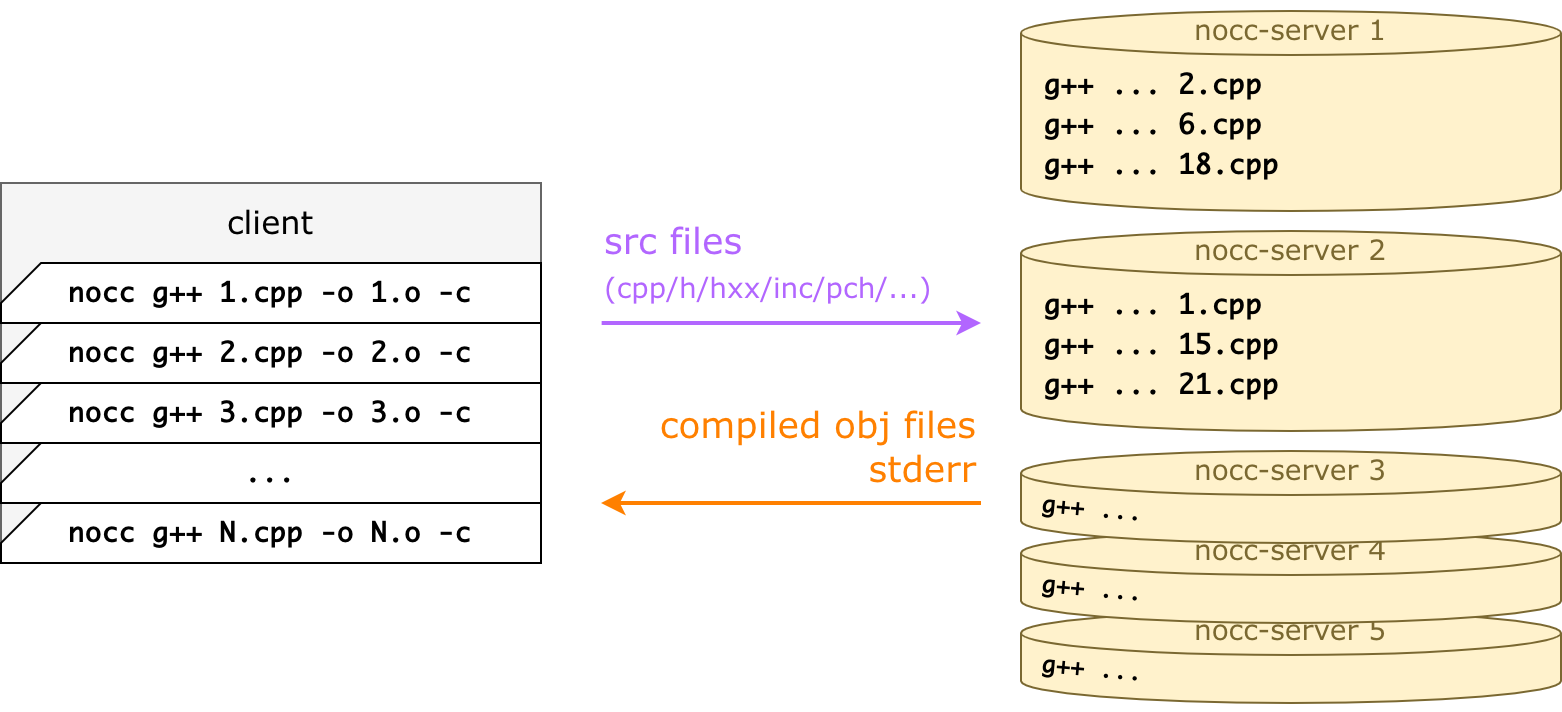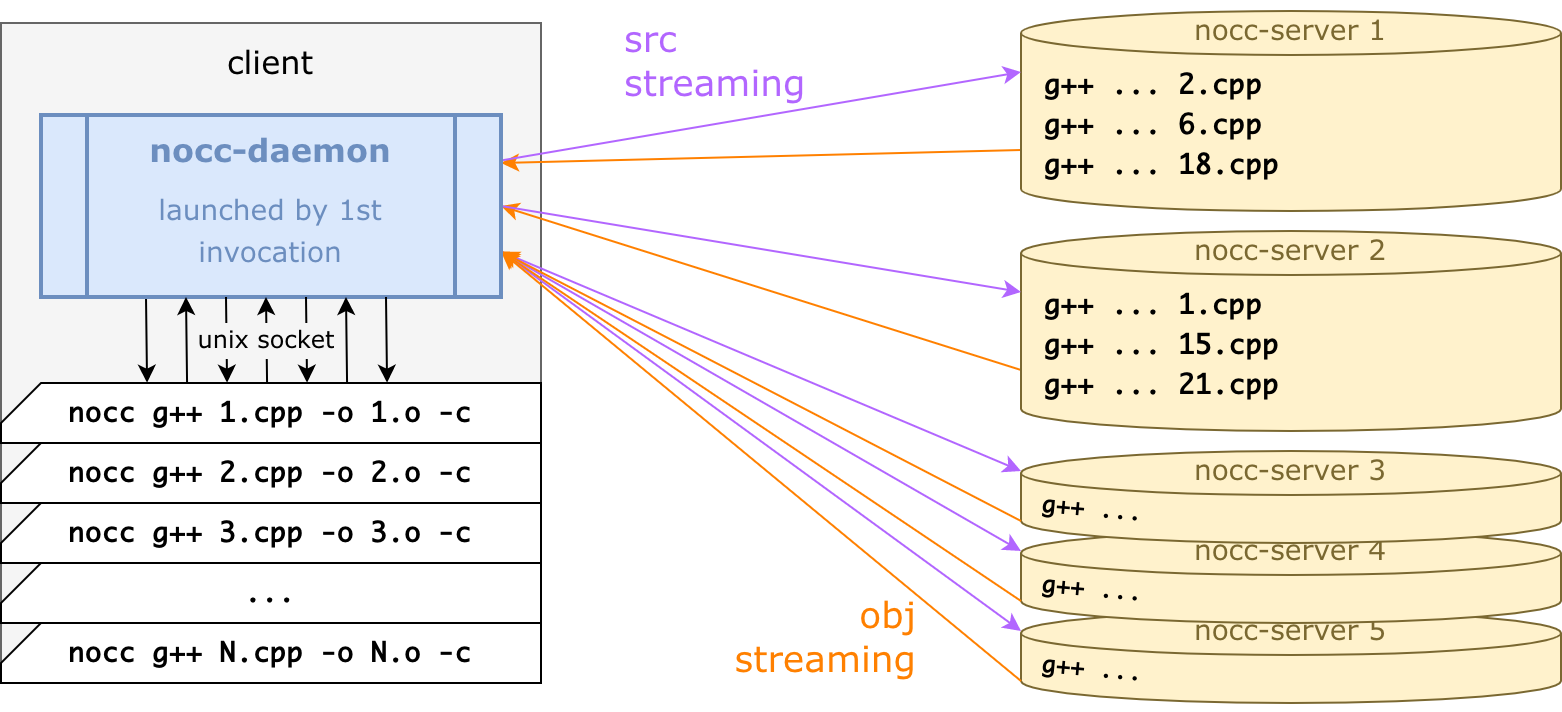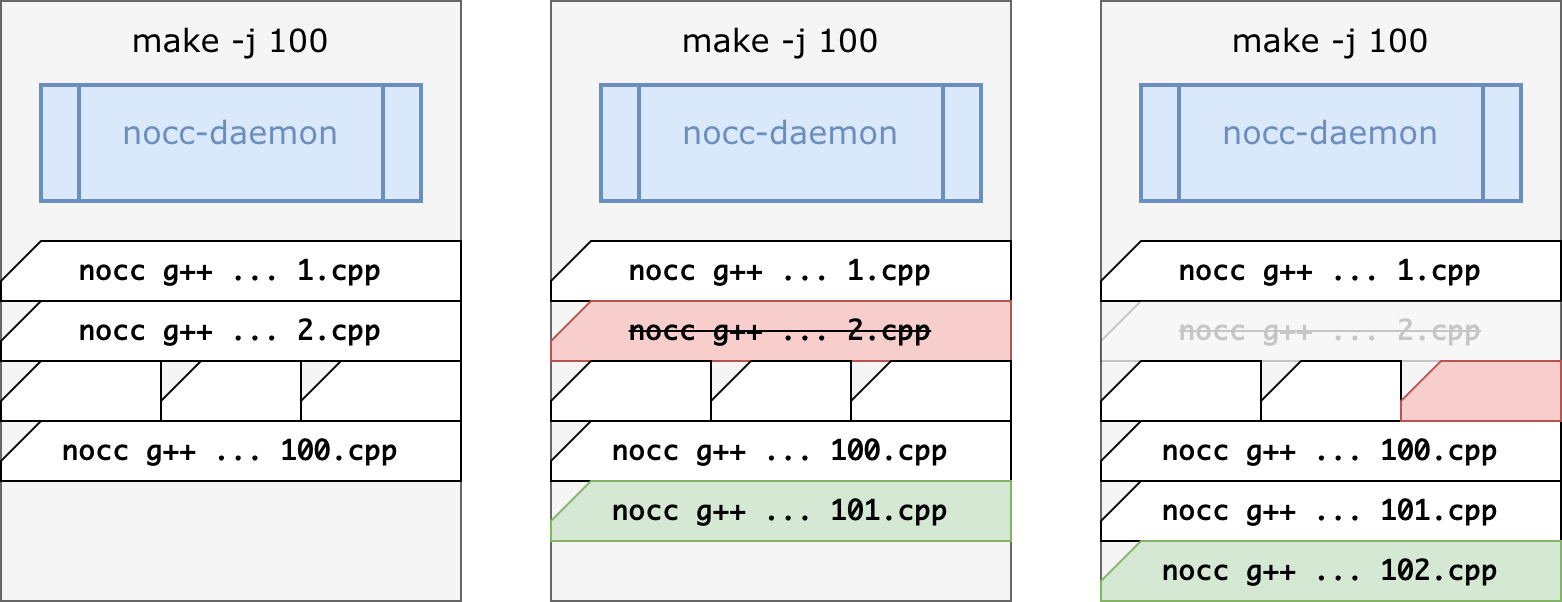nocc propagates a compiler invocation to a remote machine: nocc g++ 1.cpp calls g++ remotely, not locally.
nocc speeds up compilation of large C++ projects: when you have multiple remotes, tons of local jobs are parallelized between them.
But its most significant effort is greatly speeding up re-compilation across build agents in CI/CD and across developers working on the same project: they use shared remote caches. Once a cpp file has been compiled, the resulting obj is used by other agents without launching compilation, actually.
nocc easily integrates into any build system, since a build system should only prefix executing commands.
nocc was created at VK.com to speed up KPHP compilation.
KPHP is a PHP compiler: it converts PHP sources to C++.
VK.com codebase is huge, for how we have about 150 000 autogenerated cpp files.
Our goal was to greatly improve the performance of the "C++ → binary" step.
Since 2014, we used distcc.
In 2019, we patched distcc to support precompiled headers. That gave us 5x to performance.
In 2021, we decided to implement a distcc replacement. Finally, we got 2x – 9x over the patched version.
The easiest way is just to download ready binaries — proceed to the releases page
and download the latest .tar.gz for your system: you'll have 3 binaries after extracting.
You can also compile nocc from sources, see the installation page.
For a test launch (to make sure that everything works), proceed to this section.
For a list of command-line arguments and environment variables, visit the configuration page.
Consider the following file named 1.cpp:
#include "1.h"
int square(int a) {
return a * a;
}Having 1.h be just like
int square(int a);When you run nocc g++ 1.cpp -o 1.o -c, the compilation is done remotely:
What's actually happening here:
noccparses the command-line invocation: input files, include dirs, cxx flags, etc.- for an input file (
1.cpp),noccfinds all dependencies: it traverses all#includerecursively (which results in just one file1.hhere) noccuploads files to a server and waitsnocc-serverexecutes the same command-line (same cxx flags, but modified paths)nocc-serverpushes a compiled object file backnoccsaves1.o— the same as if compiled locally
Besides an object file, nocc-server pushes exitCode/stdout/stderr of the C++ compiler: nocc process uses them as a self output.
Conceptually, you can think of a working scheme like this:
Lots of nocc processes are launched simultaneously — much more than you could launch if you use g++ locally.
Every nocc invocation handles exactly one .cpp -> .o compilation, it's by design.
It does remote compilation and dies — nocc is just a front-end layer between any build system and a real C++ compiler.
For every invocation, a remote server is chosen, all dependencies are detected, missing dependencies are uploaded, and the server streams back a ready obj file. This happens in parallel for all command lines.
Actually, to be more efficient, all connections are served via one background nocc-daemon:
nocc-daemon is written in Go, whereas nocc is a very lightweight C++ wrapper,
the only aim of which is to pipe command-line to a daemon, wait for the response, and die.
So, a final working scheme is the following:
- The very first
noccinvocation startsnocc-daemon: a daemon serves grpc connections and actually does all stuff for remote compilation. - Every
noccinvocation pipes a command-line (g++ ...) to a daemon via Unix socket, a daemon compiles it remotely and writes the resulting .o file, thennoccprocess dies. noccjobs start and die: a build system executes and balances them.nocc-daemondies in 15 seconds afternoccstops connecting (after the compilation process finishes).
For more info, consider the nocc architecture page.
The main idea behind nocc is that the 2nd, the 3rd, the Nth runs are faster than the first.
Even if you clean a build directory, even on another machine, even in a renamed folder.
That's because of remote caches.
nocc does not upload files if they have already been uploaded — that's the src cache.
nocc does not compile files if they have already been compiled — that's the obj cache.
Such an approach dramatically decreases compilation times if your CI has different build machines or your builds start from a fresh copy. Moreover, git branch switching and merging is also a great target for remote caching.
When CMake generates a buildfile for your C++ project, you typically launch the build process with make or ninja.
These build systems launch and balance processes and keep doing it until all C++ files are compiled.
Our goal is to tell CMake to launch nocc g++ instead of g++ (or any other C++ compiler). This can be done
with -DCMAKE_CXX_COMPILER_LAUNCHER:
cmake -DCMAKE_CXX_COMPILER_LAUNCHER=/path/to/nocc ..Then make building would look like this:
CMake sometimes invokes the C++ compiler with -MD/-MT flags to generate a dependency list.
nocc supports them out of the box, depfiles are generated on a client-side.
Ninja is a build system, easily integrated to CMake instead of make.
nocc works with ninja, but there are 2 points to care about:
- Explicitly set
-j {jobs}(typically, you don't do this withninja, then it automatically spreads jobs across machine CPUs, but we need {jobs} to be a huge number). - There is an upsetting defect that (whyever)
ninjaincrementally waits for a daemon to die. A workaround is to launch a daemon manually in advance. Read more about this problem.
Originally, nocc was created to speed up compiling large KPHP projects, with lots of autogenerated C++ files.
KPHP does not call make: it has a build system right inside itself.
To use nocc with KPHP, just set the KPHP_CXX=nocc g++ environment variable.
Then nocc will be used for both C++ compilation and precompiled headers generation.
nocc treats precompiled headers in a special way. When a client command to generate pch is executed,
nocc g++ -x c++-header -o all-headers.h.gch all-headers.hthen nocc emits all-headers.h.nocc-pch, whereas all-headers.h.gch is not produced at all.
This is a text file containing all dependencies — compiled on a server-side into a real .gch/.pch.
Generating a .nocc-pch file is much faster than generating a real precompiled header, so it's acceptable to call it for every build — anyway, it will be compiled remotely only once.
Here you can read more about own precompiled headers.
It's quite incorrect to compare nocc with ccache, as ccache is not intended to parallelize compilation on remotes.
ccache can speed up compilation performed locally (especially useful when you switch git branches),
but when it comes to compiling a huge number of C++ files from scratch, everything is still done locally.
nocc also greatly speeds up re-compilation when switching branches. But nocc does it in a completely different
ideological way: using remote caches.
Because nocc was targeted as a distcc replacement, a detailed analysis of their differences is written on
the compare with distcc page.
That page includes an architecture overview, some info about patching distcc with pch support, and real build times from VK.com production.
nocc architecture is specially tuned to be as fast as possible for typical usage scenarios.
nocc-daemonkeeps all connections alive, whilenoccprocesses start and die during a build- to resolve all recursive
#include,noccdoes not invoke preprocessor: it uses its own parser instead nocc-serverhas the src cache: once1.his uploaded by any client, no other clients need to upload this file again (unless changed)nocc-serverhas the obj cache: once1.cppis compiled by any client, all other clients receive1.owithout compilation (if all dependencies and flags match)- for a
file.cpp, one and the same server is chosen every time to make remote caches reusable - shared precompiled headers: once
1.gchcompiled, no other build agents have to do it locally
Dig deeper into nocc architecture
What are the conditions to make sure that a remote .o file would equal a local .o?
nocc assumes that all remotes have the C++ compiler of exactly the same version as local.
That would ensure no difference, where exactly the compilation was launched if we have equal source files.
Since linking is done locally, remotes are not required to have all libs needed for linking.
What if I #include <re2.h> but it doesn't exist on remote?
Everything would still work.
When nocc traverses dependencies, it also finds all system headers recursively, their hash sums are sent to the remote along with the cpp file info.
If some system includes are missing (or if they differ from local ones), they are also sent like regular files,
saved to the /tmp folder representing client file structure, and discovered via special -isystem arguments added to the command-line.
How does nocc handle linking commands?
Linking is done locally. All commands that are unsupported or non-well-formed are done locally.
What happens if some servers are unavailable?
When nocc tries to compile 1.cpp remotely, but the server is unavailable, nocc falls back to local compilation.
It does not try another server, it's intentionally.
Does nocc support clang?
Theoretically, there should be no difference, what compiler is being used: g++, or clang++, or /usr/bin/c++, etc.
Even .pch files are supposed to work, as pch compilation is done remotely.
Small tests for clang work well, but it hasn't been tested well in production, as we use only g++ in KPHP and VK.com for now.
What is the optimal job/server count?
The final number that we fixated at VK.com is "launch ~20 jobs for one server".
For example, we have 32 compilation servers, and we launch ~600 jobs for C++ compilation.
This works well both when files are compiled and when they are just taken from obj cache.
Note, that if you use a large number of parallel jobs, you'd probably have to increase ulimit -n,
as nocc-daemon reads lots of files and keeps all connections to nocc C++ wrappers simultaneously.
I get an error "compiling locally: rpc error: code = Unknown desc = file xxx.cpp was already uploaded, but now got another sha256 from client"
This error occurs in such a scenario: you compile a file, they quickly modify it, and launch compilation again — a previous nocc-daemon is still running, previous file structure is still mapped to servers. Then the compilation for such file is done locally. In reality, such an error never occurs, as big projects take some time for linking/finalization after compilation (a daemon dies in 15 seconds).
Why did you name this tool "nocc"?
We already have a PHP linter named noverify and an architecture validation tool nocolor. That's why "nocc" — just because I like such naming :)




